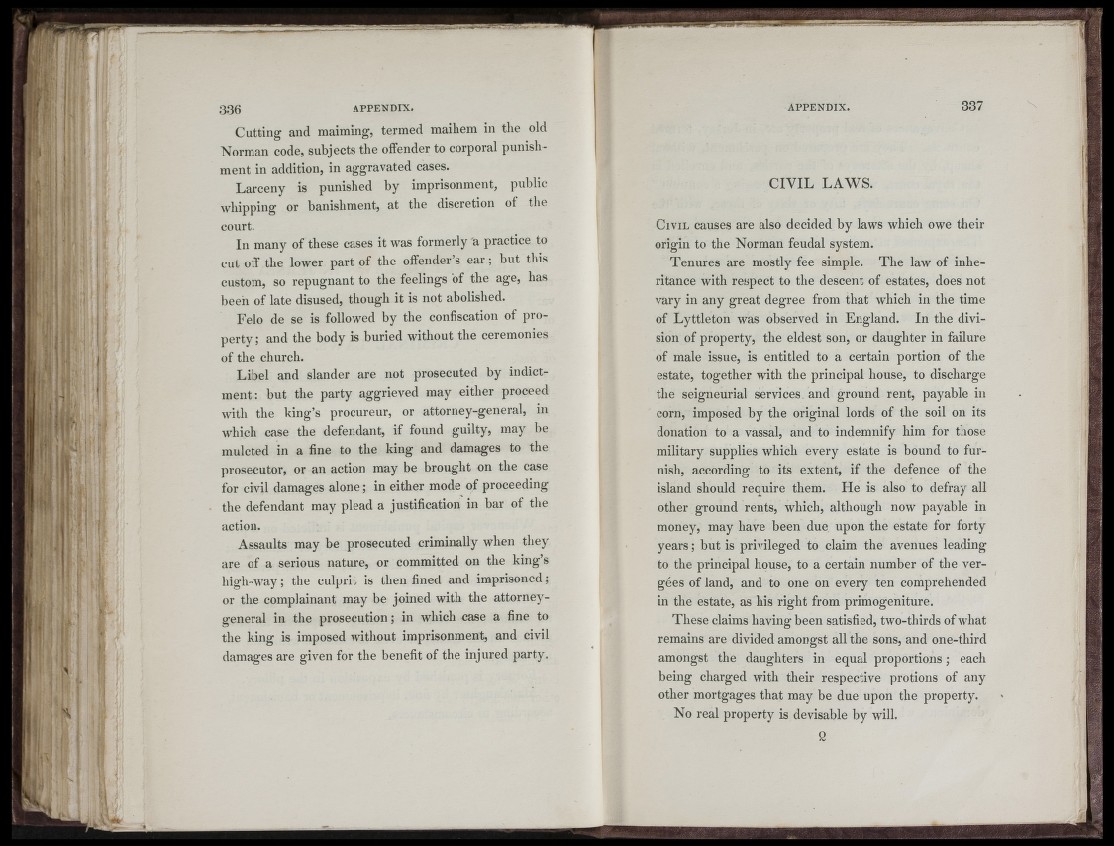
; f;:
î :7
M , ' li
1 J ■
: i E
■) !.
y
A
i i
3 3 6 APPENDIX.
Cutting and maiming, termed maihem in the old
Norman code, subjects the offender to corporal punishment
in addition, in aggravated cases.
Larceny is punished by imprisonment, public
whipping or banishment, at the discretion of tlie
court.
In many of these cases it was formerly a practice to
cut off the lower part of the offender’s ear ; but this
custom, so repugnant to the feelings of the age, has
been of late disused, though it is not abolished.
Felo de sc is followed by the confiscation of property
; and the body is buried without the ceremonies
of the church.
Libel and slander are not prosecuted by indictment:
but the party aggrieved may either proceed
with the king’s procureur, or attorney-general, in
which case the defendant, if found guilty, may be
mulcted in a fine to the king and damages to the
prosecutor, or an action may be brought on the case
for civil damages alone ; in either mode of proceeding
the defendant may plead a justification in bar of the
action.
Assaults may be prosecuted criminally when they
are of a serious nature, or committed on the king’s
high-vray ; the culprit is then fined and imprisoned ;
or the complainant may be joined with the attorney-
general in the prosecution; in which case a fine to
the king is imposed without imprisonment, and civil
damages are given for the benefit of the injured party.
S S
APPENDIX. 337
C IVIL LAWS.
C i v i l causes are also decided by laws which owe their
origin to the Norman feudal system.
Tenures are mostly fee simple. The law of inheritance
with respect to the descent of estates, does not
vary in any great degree from that which in the time
of Lyttleton was observed in England. In the division
of property, the eldest son, or daughter in failure
of male issue, is entitled to a certain portion of the
estate, together with the principal house, to discharge
the seigneurial services and ground rent, payable in
corn, imposed by the original lords of the soil on its
donation to a vassal, and to indemnify him for those
military supplies which every estate is bound to furnish,
according to its extent, if the defence of the
island should require them. He is also to defray all
other ground rents, which, although now payable in
money, may have been due upon the estate for forty
years ; but is privileged to claim the avenues leading
to the principal house, to a certain number of the vergées
of land, and to one on every ten comprehended
in the estate, as his right from primogeniture.
These claims having been satisfied, two-thirds of what
remains are divided amongst all the sons, and one-third
amongst the daughters in equal proportions ; each
being charged with their respective prêtions of any
other mortgages that may be due upon the property.
No real property is devisable by will.